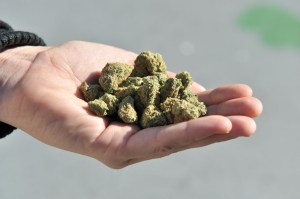In a sign of rapidly shifting attitudes towards weed in Thailand, four cops were disciplined on Tuesday after arresting a woman in her home for owning a small cannabis plant.
The arrest, which was met with harsh criticism, came just over a week before the country is set to decriminalize cannabis, as Thailand’s government breaks ground in Asia and attempts to cash in on the plant.
Videos by VICE
According to local reports, 56-year-old Pornpimol Prakobpol was greeted by plainclothes police at her home in Chonburi province on Monday. They had initially said that they were investigating a case of missing motorcycles, but arrested her after spotting a potted cannabis plant in her bedroom. The plant, which weighed about 20 grams and stood at around 30 centimeters, bore five or six leaves.
Despite her neighbors’ attempts to stop the arrest, the officers insisted on taking Pornpimol to the local station. Pornpimol was released the next day, but not before spending the night in a cell after her husband, Choo Prakobpol, was unable to raise the 15,000 baht ($437) needed for her bail.
Her husband later told reporters that they were using the plant to relieve high blood pressure and diabetes. They also sometimes added it to their food.
After Pornpimol’s arrest was reported in several local news outlets, it was announced on Tuesday that the officers involved were transferred to “inactive posts,” a vague form of punishment which usually sees police bound to desk jobs. In light of the incident, Chonburi provincial commander Atthasit Kitjahan urged officers to exercise judgment before they arrested cannabis growers. The cops were confused between the old and new cannabis laws, he added.
Pornpimol’s arrest comes just one week before Thailand’s much-publicized decriminalization of cannabis is set to take effect on June 9, which will allow people to grow unlimited amounts of cannabis at home.
In December 2018, Thailand made global headlines by legalizing cannabis for medical use. Then, in February this year, Public Health minister Anutin Charnvirakul signed a measure removing cannabis from the country’s narcotics list.
“We will try to be as relaxed as possible, so people can have access to cannabis,” said Anutin, who is at the forefront of a governmental push to develop the local cannabis industry in Thailand, which has become the first country in Asia to de facto decriminalize the plant.
Last month, Anutin even announced that the government would be giving away one million free cannabis plants for citizens to grow at home, once restrictions on cannabis possession are lifted come June 9.
With the government looking to capitalize on the lucrative cannabis industry, lots of buzz has generated around the plant, which until recently could see people jailed for up to five years for possession. In recent months, cannabis products and businesses have sprung up amid a green rush, all looking to gain a foothold in the country’s budding cannabis scene.
In anticipation of the imminent liberalization, Thailand’s Food and Drug Administration announced on Wednesday it was launching Plook Ganja (plant ganja)—a phone app and website where people can register their homegrown cannabis plants. The app will allow authorities to keep track of where and how much cannabis is being grown, while also serving as a platform for businesses to source raw cannabis.
But despite the government’s eagerness to legalize cannabis, most prominently with the liberalization of plant ownership, activists point to the legal ambiguity that still surrounds its use. Thailand’s government is attempting to position itself to reap the economic benefits of cannabis through medicine and tourism, while still discouraging its own citizens from indulging in recreational use of the drug.
This delicate balancing act has led to seemingly contradictory legislation. While growers can produce unlimited amounts of the plant at home, it is only permitted for medicinal purposes. Under current legislation it is illegal to consume more than trace amounts of cannabis, with extracts containing more than 0.2 percent THC (the psychoactive element that elicits the “high”) banned.
In recognition of these legal inconsistencies, the Thai cabinet has said it is racing to introduce laws before June 9 that look set to permit consumption of cannabis at home. Whether this will extend to private businesses remains unclear.
“Our principle is that we choose to use marijuana to get the maximum benefits, but we will control the use that will cause punishment,” said member of parliament Saphachai Jaismut in a Facebook post on Wednesday. “In fact, we trust Thai people that everyone is smart enough to take care of their own lives.”
More
From VICE
-

(Photo by Francesco Castaldo/Pacific Press/LightRocket via Getty Images) -

M Scott Brauer/Bloomberg via Getty Images -

Firefly Aerospace/YouTube -

Justin Paget / Getty Images



